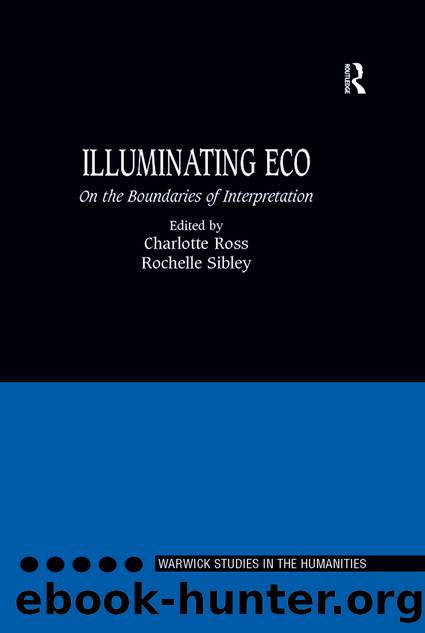Illuminating Eco by Ross Charlotte;Sibley Rochelle;

Author:Ross, Charlotte;Sibley, Rochelle;
Language: eng
Format: epub
Publisher: Taylor & Francis Group
Chapter 8
The Serendipities of Semiotics, or Knowledge as a âTheory of Next Thursdayâ
Charlotte Ross
There could be no fairer destination for any theory than that it should point the way to a more comprehensive theory in which it lives on, as a limiting case. (Einstein)
Every solution raises unsolved problems. (Popper)
Ecoâs parodic phrase a âtheory of next Thursdayâ appears in his 1964 publication Apocalittici e integrati. He uses it to argue the impossibility and indeed the vanity of theorising highly changeable phenomena such as mass media. In his view, this type of theoretical modality is necessarily provisional, or âconceived in the conditional tenseâ.1 Yet much as here he casts aspersions on discussions composed uncertainly of mere âhypothetical syllogismsâ, Eco elsewhere implies that all theories and the âknowledgeâ they produce are essentially serendipitous. If knowledge is no less, but no more, than âthe sum of what is knownâ, then its value and duration are as provisional as the type of theorising he ridicules above.2 As I argue below, Eco not only tolerates, but gladly embraces the necessary condition of living in error, fascinated by the âFakes and Forgeriesâ that populate our epistemological heritage.3 This interest has most recently been consolidated by the publication of Serendipities, a series of investigations into how ideas once considered false have been proved right, and vice versa, since âfalse beliefs and discoveries totally without credibility [can] lead to the discovery of something true (or at least something we consider true today)â(S, viii).4
This essay explores some of Ecoâs attempts to assess the kind of knowledge or âtruthâ we can realistically hope to discover through interpretation, and what degree of accuracy can â or should â be attributed to both the result and the methodology used to discover it. How do we approach âknowledgeâ that is no more than a temporary solution? If structuralism proposed stable, universal frameworks, its successor should incorporate elements of these (as Einstein suggests) whilst alerting us to new found inadequacies in the former approach. Eco seems to achieve this by privileging both an elusive ontological truth and a freeplay of semantic signifiers. This dual focus produces an interesting problematic, as the existence of an original truth is often seen to presuppose teleological progression. However, if the meaning accessible to us relies on new input (ever changing, arbitrary signifiers, devised by human intervention) rather than its derivation from this truth (a state beyond human interference), the material we have at our disposal is far removed from such an origin. Discovery of the truth would seem to require that both the material of signifying language and the original truth share the same source, trapping us in the essentialist framework poststructuralism claims to have exploded.
In La struttura assente, official notification of his move into poststructuralist thought, Eco stages a compelling contest between versions of semiotic and structural approaches to obtaining knowledge; a discussion that is partly reproduced in The Open Work.5 The first part of the present essay examines his portrayal of this contest, questioning both the durability of theoretical approaches, and their status as stand-alone hermeneutic instruments.
Download
This site does not store any files on its server. We only index and link to content provided by other sites. Please contact the content providers to delete copyright contents if any and email us, we'll remove relevant links or contents immediately.
The Power of Myth by Joseph Campbell & Bill Moyers(681)
Four Shakespearean Period Pieces by Margreta de Grazia(666)
A Social History of the Media by Peter Burke & Peter Burke(640)
Inseparable by Emma Donoghue(610)
The Complete Correspondence 1928-1940 by Theodor W. Adorno & Walter Benjamin(510)
Bodies from the Library 3 by Tony Medawar(487)
The Spike by Mark Humphries;(469)
Culture by Terry Eagleton(465)
A Theory of Narrative Drawing by Simon Grennan(461)
World Philology by(452)
Ideology by Eagleton Terry;(445)
Farnsworth's Classical English Rhetoric by Ward Farnsworth(444)
A Reader’s Companion to J. D. Salinger’s The Catcher in the Rye by Peter Beidler(432)
Adam Smith by Jonathan Conlin(425)
Comic Genius: Portraits of Funny People by(410)
Monkey King by Wu Cheng'en(403)
Game of Thrones and Philosophy by William Irwin(400)
High Albania by M. Edith Durham(399)
Early Departures by Justin A. Reynolds(383)
